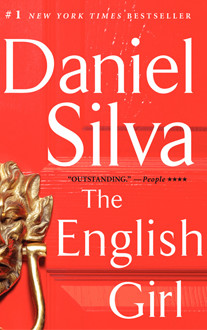Questions for Discussion
1. Gabriel Allon has settled with Chiara in Jerusalem. Considering this location and the specific description of their home at the beginning of Chapter 3, how would you describe the state he’s in at this point in his life?
2. Consider the fictional version of the painting of grandioso Susanna and the Elders believed to be by Jacopo Bassano. What do the details offered about her story add to how you think about Madeline Hart?
3. Gabriel, once a talented painter of original works, admits he began to study art restoration because his profound and brutal three-year experience at the center of operation Wrath of God changed him. What might he have lost that a creative artist needs?
4. Graham Seymour, Deputy Director of Britain’s MI5, is close to Gabriel as fellow members of “a secret brotherhood who did the unpleasant chores no one else was willing to do” to keep their countries safe. What else accounts for Gabriel’s willingness to trust and work with him?
5. Seymour responds to Gabriel’s compliment about an esteemed career by saying that “it’s difficult to measure success in the security business, isn’t it? We’re judged on things that http://circleplastics.co.uk/2017/09/26/volkswagens-car-towers-at-autostadt-in-wolfsburg-germany/ don’t happen—the secrets that aren’t stolen, the buildings that don’t explode. It can be…profoundly unsatisfying.” What are other important careers or actions that prove difficult to measure regarding success?
6. After Madeline is kidnapped, she appears in a video “as if she were responding to questions posed by a television interview.” What connotations does this simile, another journalistic reference, add to the scene?
7. In what various ways does the relationship between Gabriel and Chiara demonstrate real equality? In what ways are they valuably different?
8. What layers of meaning are added to the novel by the fictional discovery and museum exhibition of the “twenty-two pillars of Solomon’s Temple”?
9. How does Chiara’s tragic experience at the hands of Ivan Kharkov and that of Gabriel’s first wife and only son Daniel affect Gabriel’s decisions and actions regarding Madeline Hart?
10. What does the location of Corsica and what goes on there bring to the novel? What about the details of the macchia?
11. Examine the fascinating character of the signadora. What does her supernatural presence and behavior bring to the novel? How does this fit or contradict Gabriel’s belief system, one quite important to how he goes about his job? What are the possible benefits or dangers of belief in such a medium?
12. Consider the character of Christopher Keller and his elaborate evolution from upper-middle-class Brit to rebellious soldier and top member of the SAS’s Regiment to presumed dead rogue assassin-for-hire employed by Don Orsati. In what ways are he and Gabriel similar or different?
13. Explain the details and psychology that allows Gabriel to trust and work with Keller, someone who was at one point hired to kill him. What qualities are necessary to transform a work relationship into a friendship?
14. What does the banter between Gabriel and Christopher Keller add to the novel? What’s the role of humor in a work of such weighty subject matter?
15. Consider the many artists and works of art mentioned throughout the novel (Bassano, Viktor Frankel, Bellini’s San Zaccaria altarpiece, Cezanne, Matisse, Monet, Puccini, Wagner, Dumas, Dickens, Forster, etc.). What specific and overall effects do such references have?
16. A number of times Gabriel mentions the immense amount of waiting, often intense or stressful waiting, “always the waiting.” What’s challenging about such a seemingly simple activity?
17. Will Gabriel make a good director of Israel’s secret intelligence service? Why or why not?
18. What profound effects would becoming a father again have on Gabriel?




























